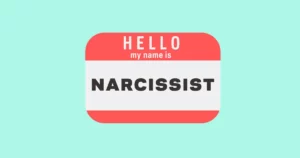Narcissism is a personality disorder that is characterized by an inflated sense of self-importance, a need for admiration, and a lack of empathy for others. Narcissists often have a difficult time maintaining healthy relationships due to their egocentric nature. There are two types of narcissists: overt and covert. Overt narcissists are easy to spot because they display many of the classic symptoms of narcissism. Covert narcissists, on the other hand, are much more difficult to identify because they mask their narcissistic tendencies behind a facade of humility and modesty. In this blog post, we will discuss a covert narcissist signs.
Contents
Who Is A Covert Narcissist?
 We all are aware of who a narcissist is. It’s not easy to miss a person with an inflated ego, who loves being the center of attention, and who seems to lack empathy for others. But there is another type of narcissist that is not so easy to spot: the covert narcissist.
We all are aware of who a narcissist is. It’s not easy to miss a person with an inflated ego, who loves being the center of attention, and who seems to lack empathy for others. But there is another type of narcissist that is not so easy to spot: the covert narcissist.
Covert narcissists are highly skilled at hiding their true colors. They are experts at playing the victim and they are very good at manipulating others. Covert narcissists often appear to be shy, sensitive, and introverted. They may seem like the perfect partner or friends because they are so helpful and always willing to lend a listening ear. But beneath their surface lies a different story. They may prove to be self-absorbed, manipulative, and demanding.
It is important to note that not all introverts or shy people are covert narcissists. In fact, many introverts are kind, compassionate, and empathetic individuals. It is only when you start to see the signs and symptoms of covert narcissism that you should be concerned.
What Are The Signs Of A Covert Narcissist?
There are several signs that you may be dealing with a covert narcissist. It’s important to remember that not everyone who displays these signs is a narcissist. But if you notice any of these signs in someone, they may be a threat.
Shy or introverted
This is a rather obvious and common sign. Covert narcissists are often introverted or shy because they are afraid of being exposed. They are afraid that if people see the real them, they will be rejected and ridiculed. So, they put up a front that is the opposite of who they really are.
For instance, they may pretend to be shy in order to get people to feel sorry for them. Or, they may act introverted so that people will think they are deep and mysterious.
Always willing to help
Covert narcissists are always willing to help because they want to appear generous and kind. They want people to think that they are good people who care about others. However, their help is often not genuine. They may only help you if they think it will benefit them in some way.
For example, they may offer to help you move because they know you will have to pay them back with favors. Or, they might volunteer to babysit your kids so that they can get some alone time.
Manipulative
 Covert narcissists are very manipulative. They often use manipulation to get what they want from others. They may manipulate you by playing with your emotions. For instance, they may act like they are really hurt in order to get you to do something for them. Or, they may pretend to be interested in you so that you will pay more attention to them.
Covert narcissists are very manipulative. They often use manipulation to get what they want from others. They may manipulate you by playing with your emotions. For instance, they may act like they are really hurt in order to get you to do something for them. Or, they may pretend to be interested in you so that you will pay more attention to them.
Covert narcissists are also experts at gaslighting. Gaslighting is a form of emotional abuse where the abuser manipulates the victim into doubting their own reality. For example, a covert narcissist may tell you that you are overreacting to a situation when you are not. Or, they may deny ever saying something that they said. Gaslighting can be very confusing and frustrating for the victim.
Sensitivity to criticism
This may be a sign that the person is a narcissist. Covert narcissists are very sensitive to criticism because they have fragile egos. They cannot handle being told that they are wrong or that they are not good enough. This often leads them to lash out at the person who criticizes them.
For instance, if you point out that the covert narcissist is being selfish, they may get defensive and start an argument with you. Or, if you tell them that you don’t like the way they are treating you, they may accuse you of being too sensitive.
Need for admiration
Narcissists in general have a need for admiration. They want people to think that they are the best and they will do whatever it takes to get people to praise them. For example, they may brag about their accomplishments or try to make themselves look good all the time.
However, in covert narcissists, this need may manifest itself in different ways. For instance, they may fish for compliments by putting themselves down. Or, they may try to make you feel sorry for them so that you will give them the attention they crave. Moreover, they may try to make you feel indebted to them so that you will keep giving them compliments.
Grandiose fantasies
 Narcissists tend to have grandiose fantasies. They fantasize about being rich and famous or having power over others. In many cases, these fantasies are completely unrealistic. For example, a covert narcissist may fantasize about being a world-famous musician even though they can’t play an instrument. Or, they may fantasize about being the CEO of a major corporation even though they don’t have any business experience.
Narcissists tend to have grandiose fantasies. They fantasize about being rich and famous or having power over others. In many cases, these fantasies are completely unrealistic. For example, a covert narcissist may fantasize about being a world-famous musician even though they can’t play an instrument. Or, they may fantasize about being the CEO of a major corporation even though they don’t have any business experience.
These grandiose fantasies help narcissists feel better about themselves. They give the narcissist a sense of importance and power that they would not otherwise have. With covert narcissists, these fantasies often stay in their heads because they are afraid to share them with others.
A tendency to hold grudges
Grudges are the bread and butter of the narcissist. They love to hold onto grudges because it gives them a sense of power over the other person. For covert narcissists, holding a grudge is often a way to control the other person.
For example, if you do something that the covert narcissist doesn’t like, they may hold a grudge against you and try to make you feel guilty. Or, they may use the grudge as a way to manipulate you into doing what they want. Moreover, they may bring up a grudge every time they are upset with you in order to make you feel bad.
Envy
Envy is a feeling of jealousy and resentment. It is often directed toward people who have something that the narcissist wants. For example, a covert narcissist may be envious of your success or your happy family life.
Envy is often the root of many narcissistic behaviors. For instance, a covert narcissist may try to sabotage your success so that you will feel as bad as they do. Or, they may try to tear down your happy family life so that you will feel as empty and alone as they do.
Passive aggressive behaviors
 This type of behavior is often seen in people who are afraid to express their anger directly. Instead, they express it indirectly through passive-aggressive behaviors. For example, a covert narcissist may give you silent treatment or make snide comments instead of outright telling you that they are angry with you.
This type of behavior is often seen in people who are afraid to express their anger directly. Instead, they express it indirectly through passive-aggressive behaviors. For example, a covert narcissist may give you silent treatment or make snide comments instead of outright telling you that they are angry with you.
These behaviors can be very frustrating for the victim because they often don’t know what the covert narcissist is really feeling. Is the covert narcissist really angry? Or are they just trying to manipulate you into giving them attention?
In some cases, passive-aggressive behavior may be a way for a covert narcissist to express their anger without having to deal with the consequences. For instance, if they outright told you that they were angry, you might get mad at them or leave them. But if they just give you the silent treatment, they can still maintain control over the situation.
Lack of boundaries
Disregarding boundaries is a common trait of narcissists. They often feel like they are entitled to invade your personal space and privacy. For example, a covert narcissist may go through your things without asking or invade your personal space when you are talking.
This lack of boundaries can be very confusing and frustrating for the victim. On one hand, you may feel like the narcissist is being too clingy and needy. But on the other hand, you may feel like they are not respecting your privacy.
In some cases, this lack of boundaries may be a way for the narcissist to control you. For instance, if they know about your fears or weaknesses, they can use that information to manipulate you.
Insecure and jealous
Lastly, covert narcissists are often insecure and jealous. They are always worried that someone is going to take away what they have or that they are not good enough.
This insecurity often leads to jealousy. The covert narcissist may be jealous of your success or your happy family life. They may also be jealous of your friends or the attention you give to others.
The covert narcissist’s jealousy can often be the root of their narcissistic behaviors. For instance, they may try to sabotage your success or tear down your happy family life in order to make you feel as bad as they do.
These are some of the traits and signs that you may be dealing with a covert narcissist. It can be particularly difficult to deal with covert narcissists because they are often very good at hiding their true colors. However, if you think you might be dealing with a covert narcissist, it is important to get help from a professional. They can help you understand the narcissist’s behaviors and how to deal with them.
How To Deal With A Covert Narcissist?
 Now that we know how to identify and set apart the covert narcissist signs, symptoms, and characteristics let’s explore how to deal with them.
Now that we know how to identify and set apart the covert narcissist signs, symptoms, and characteristics let’s explore how to deal with them.
- The first step is acknowledging that you are dealing with a covert narcissist. This can be difficult because they are often very good at hiding their true colors. However, if you think you might be dealing with a covert narcissist, it is important to get help from a professional. They can help you understand the narcissist’s behaviors and how to deal with them.
- The second step is setting boundaries with the narcissist. It is important to establish boundaries early on so that the narcissist knows what behavior is acceptable and what behavior is not. For example, you may need to set boundaries around personal space or privacy.
- The third step is learning to love yourself. This is particularly important if you are in a relationship with a covert narcissist. The narcissist will often try to tear you down and make you feel bad about yourself. However, it is important to remember that you are not responsible for the narcissist’s feelings or behaviors. You are worthy of love and respect, no matter what the narcissist says or does.
- The fourth step is to get help from a professional. If you are struggling to deal with a covert narcissist on your own, it is important to get help from a therapist or counselor. They can provide you with support and guidance as you learn how to deal with narcissistic behavior.
- There are also some other resources that may be helpful, such as books or articles on dealing with narcissism. Lastly, it is important to remember that you are not alone. There are other people who have been through what you are going through. You can find support from friends, family, or even online support groups.
Dealing with a covert narcissist can be difficult, but it is possible. By following these steps, you can begin to take back control of your life and start healing from the damage that has been done.
Conclusion
Conclusively, a covert narcissist signs, symptoms, characteristics, and how to deal with them have been explored. If you think you might be dealing with a covert narcissist, it is important to get help from a professional. They can help you understand the narcissist’s behaviors and how to deal with them. You are not alone. There are other people who have been through what you are going through.
If you or someone you know is struggling with depression, Therapy Mantra is here for you. We are the leading providers of online therapy and counseling. Our team of highly trained and experienced therapists can help you work through your depression. Contact us today to learn more about our services. You may also visit our website to book an online therapy session or download our free Android or iOS app for more information.


